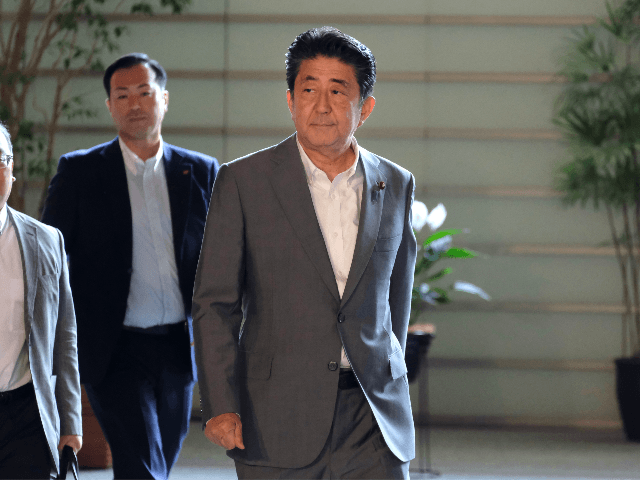Japanese Prime Minister Abe Shinzo has not visited the controversial Yasukuni Shrine since 2013, but he paid for a ritual offering on Thursday, which was enough to ruffle feathers across Asia.
The shrine is seen in Japan as a memorial to peace, and by many other Asian nations as a nostalgic celebration of Japan’s militaristic era.
Yasukuni is a Shinto shrine in Tokyo that honors Japan’s three million World War II dead, including 14 convicted war criminals, among them the infamous war leader General Hideki Tojo. Thursday was the 74th anniversary of Japan’s surrender at the conclusion of the war.
Many Japanese feel they should be able to honor those who died in the war without being seen as endorsing imperialism, militarism, or war crimes. Abe made his offering very delicately, reimbursing an aide and former defense minister named Tomomi Inada, who purchased a tamagushi, a branch of the sacred sakaki tree decorated with paper or silk. Abe pointedly instructed that the donation was coming from him personally, not from his offices as the Prime Minister of Japan or the head of the governing Liberal Democratic Party (LDP).
“Entering the Reiwa era, I again think that our country’s peace and prosperity are thanks to those who offered their lives for our country. I am full of gratitude and respect for them,” Abe said when he paid for the offering, according to his aide.
The Reiwa era is a reference to the reign of Japan’s new Emperor Naruhito, who made his first official appearance on Thursday at a memorial service for the war dead at the Nippon Budokan Hall in Tokyo. Naruhito’s reign began on May 1 following the abdication of his father Akihito.
“Bearing in mind the feelings of deep remorse, I earnestly hope that the ravages of war will never again be repeated,” Emperor Naruhito said at the ceremony, whose anticipated turnout was somewhat depressed by the approach of a typhoon.
Abe also spoke at the ceremony, declaring that the “pledge to never again repeat the horrors of war will remain unchanged from the Showa and Heisei eras and continue as well in the Reiwa Era.”
This sounds like a fine sentiment, but as Asahi Shimbun pointed out, Abe caused some hurt feelings overseas by long ago abandoning the custom of offering “remorse” or “condolences” to the countries that were attacked by Imperial Japan. This, combined with his determination to build up Japan’s military and revise its pacifist constitution, tends to add a layer of controversy to his statements on World War II.
Some Japanese politicians do visit the Yasukuni shrine in person, although none of Abe’s Cabinet officials have done so since 2017. This year’s contingent included LDP Executive Acting Secretary-General Koichi Hagiuda and lawmaker Shinjiro Koizumi, who is the son of former Prime Minister Junichiro Koizumi.
“Visits and ritual offerings made in person or by proxy to the infamous shrine by Japanese leaders and officials have consistently sparked strong criticism and hurts the feelings of China and South Korea and other countries brutalized by Japan during WWII,” China’s Xinhua news service editorialized on Thursday, sending unsubtle signals that Abe might want to distance himself even further from the Yasukuni shrine next year, when Chinese Communist Party leader Xi Jinping is scheduled to visit.
For his part, South Korean President Moon Jae-in made a bid to repair extremely strained relations with Japan on Wednesday by declining to attend a ceremony memorializing the “comfort women” pressed into sexual slavery by occupying Japanese forces in World War Two. Moon did attend the event last year when it was inaugurated.
Moon did post a statement on Facebook pledging that his administration will “do its best to restore the dignity and honor of the victims,” but he refrained from criticizing the current Japanese government.
Wednesday saw another ceremony in Seoul at which statues of comfort women from South Korea and other nations occupied by Imperial Japan, including China and the Philippines, were unveiled on the site where a Shinto shrine built by occupying Japanese forces once stood. At the ceremony, 90-year-old former comfort woman Lee Yong-soon called on Japanese Prime Minister Abe to apologize to her personally for her suffering.

COMMENTS
Please let us know if you're having issues with commenting.